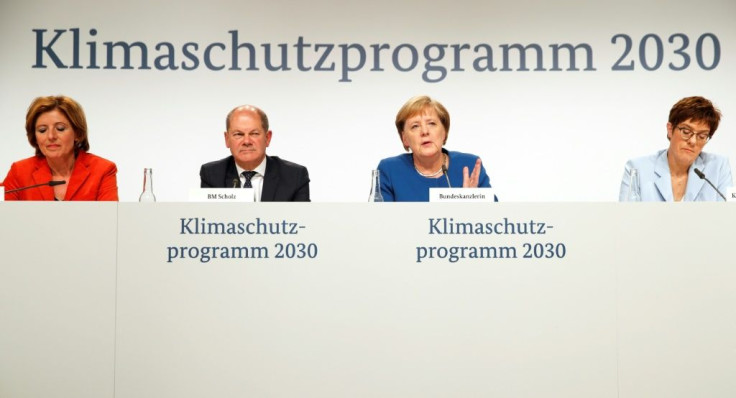Key Points Of Merkel's New Climate Strategy

German Chancellor Angela Merkel's government Friday announced a sweeping climate policy package worth at least 100 billion euros ($110 billion euros) by 2030.
Its aim is to discourage the burning of oil, coal and gas in order to reduce Earth-warming carbon emissions and strengthen clean renewable power, energy efficiency and zero-emission cars.
Here are some key points from the package, yet to be turned into laws, which aim to reduce Germany's greenhouse gas emissions by at least 55 percent from 1990 levels by 2030.
Electric cars
Germany will aim to bring seven million to 10 million zero-emission electric cars onto the roads by 2030, to be supplied by a network of one million charging stations.
A subsidy for e-cars worth several thousand euros each, to be co-financed by the government and manufacturers, will be granted for models below 40,000 euros from 2021.
The motor vehicle tax will also be adjusted to reward green mobility and discourage vehicles with CO2 emissions.
Planes, trains
The plan aims to replace polluting short-haul flights with greener train travel.
The air traffic tax will rise from January 2020, and airlines are to be barred from selling loss-making bargain tickets.
The price of train tickets will drop by some 10 percent due to reduction in the value-added tax on them.
Some 86 billion euros are to be ploughed into railway infrastructure, and pilot projects will test one-euro-a-day urban public transport passes.
Home heating
Subsidies will encourage replacing oil-fired home heating systems with more climate-friendly models, with the state paying for up to 40 percent of the cost.
Installing new oil heating systems will be prohibited from 2026 in most cases.
Tax incentives will encourage energy-saving building renovations, especially to reduce heat loss in the cold winter months.
Wind, solar power
The government aims to further boost wind and solar power, which now make up the lion's share of the renewables which account for 38 percent of Germany's electricity demand.
To increase local acceptance of new wind farms, now often held up by court challenges, nearby municipalities will be allowed greater participation in their operation for profit.
Solar power systems, most widespread in southern Germany, will be further subsidised, and offshore wind energy in the North and Baltic Seas expanded.
Germany's goal is to raise the share of green energy to 65 percent of electricity demand by 2030, while nuclear power is to be phased out by 2022 and coal by 2038 at the latest.
Carbon trading
Fossil fuel use is to be discouraged through a national emissions trading scheme for the transport and buildings sectors, complementing an existing European system for energy and industry.
This will increase the cost of petrol and diesel, though long-distance commuters will be compensated with tax breaks.
The polluter-pays scheme encourages businesses and consumers to use green energy and technology in order to avoid the direct or indirect cost of right-to-pollute certificates.
A tonne of CO2 emissions will initially be priced at a symbolic 10 euros from 2021, and this is set to rise to 35 euros by 2025.
After that, the emission rights will be auctioned within a range of 35 to 60 euros.
A maximum emission quantity for Germany will be decided and then decreased year by year, while the auction mechanism will set the price of CO2 according to demand and supply of emission permits.
© Copyright AFP 2024. All rights reserved.





















